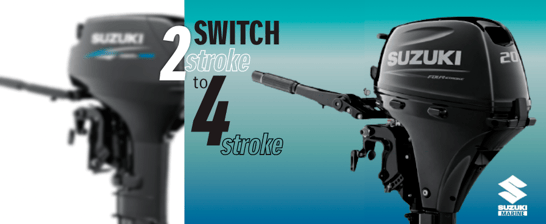
Times are changing, but one fact remains, you need a reliable and durable outboard for your boat and operation.
Have you considered changing from a two-stroke to a four-stroke? You really cannot go wrong with either choice. Both motors have their advantages and limitations.
This blog will put your mind at ease, ensuring you have the facts before making that decision.
Taking a quick view at four-stroke outboards we know that they offer better fuel efficiency, are more environmentally friendly, release fewer pollutants, they require fewer lubricants but a four-stroke is a bigger financial outlay initially however with the current price of fuel, the savings in fuel and lubricant cost can very well make up for the price difference between a 2 and 4-stroke.
Let's look at the engineering behind the two:
A two-stroke outboard has a simple design completing its power cycle in two strokes of the piston, this makes it powerful it also does not use valves to regulate the fuel /air intake. It has fewer parts and is a bit smaller and lighter.
The four-stroke engine is mechanically more involved, with four piston strokes to complete a power cycle, hence the name. This gives it more torque. A valve train controls the intake and exhaust functions, providing less harmful emissions and providing fuel efficiency.
Suzuki four-stroke outboard motors are however designed with easy and low maintenance in mind with technologies like the self-adjusting timing chain.
2 Stroke outboards
Pro’s
- Lighter outboards
- Accelerate fast, in some cases more top end
- The purchase price is less than a 4-stroke outboard
Con’s
- More Pollution
- More noise
- Smoke
- Fuel and oil need to be mixed in non-oil injection models
- Could be harder to start
- Spark Plug Fouling
- Heavier on fuel
4 Stroke outboards
Pro’s
- Quiet and smooth operation
- Good fuel economy
- Can be used for trolling
- No oil and fuel mixture
- Less Pollution
- Smooth Idle
- Reliable and durable
- Reasonable weight
Con’s
- Slightly heavier
- Contains more movable parts
- Slightly harder to transport
Now that you have the Pro’s and Con’s laid out it should be easier for you to make an educated decision the best outboard to power your boat or operation.
